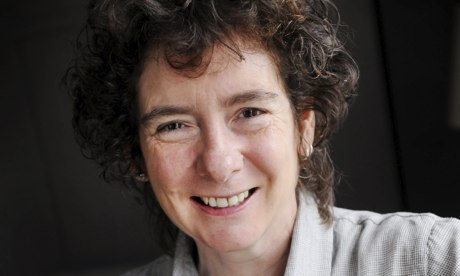
In her memoir of her childhood and subsequent excavation of its mysteries in adulthood (or perhaps it is better described as an anti‑memoir, so gleefully does it disrupt ideas of personal memory, stable subjectivity and linear narrative), Jeanette Winterson movingly describes what the discovery of books meant to her. Bear in mind that this was a child who frequently found herself locked out in disgrace and left on the doorstep, and for whom admission to the indoors world was an uncertain blessing in any case, given that her mother kept a revolver in the duster drawer. Mrs Winterson didn't like books, largely on the grounds that you didn't know what was in them until it was too late, and for the teenage writer-to-be, reading was at best clandestine and at worst jeopardised everything.
Nonetheless, decides Winterson (pictured) in Why Be Happy When You Could Be Normal?, books are very definitely where it's at. "Books don't make a home," she writes, "they are one." But while a home, a happy one at any rate, might be a place of peace and acceptance, it is not necessarily without its challenges. "Reading," as Winterson writes, "is where the wild things are."
The writer expanded on these themes, and many more besides, at the launch event for Shelf Help, a series of books published by Vintage Books and curated by me. The idea was simple: to come up with a dozen titles to get you through the year – to stimulate the intellect, to nourish the soul, to soothe the central nervous system; books that could act at once as a home and as a place to explore the "wild things". We wanted to be a sort of antidote to self-help, in the sense that we do not promise you dramatic results or radical turnarounds; alas, we will not make you thinner, or richer. Instead, we say: "New year, same you – but with a really cracking reading list."
The fun part was how different they all ended up being; the downside was the ones we had to leave out because, as we all know, vaulting over-ambition is a quick route to underachievement and consequent self-loathing (we haven't entirely eschewed the self-help idea, you see). A book a month seemed a reasonable target. January has kicked off with Stephen Grosz's The Examined Life, and Winterson follows in February: subsequent titles include Far from the Tree, Andrew Solomon's extraordinary new exploration of unusual families, and Richard Mabey's Nature Cure, which describes the author's depression and the revivifying power of landscape; novels by Deborah Moggach, Sebastian Faulks and John Williams's Stoner; exuberantly unclassifiable encounters in Sarah Bakewell's study of Montaigne, How to Live, Roger Deakin's Waterlog and Tim Parks's Teach Us to Sit Still; and captivating variations on the family memoir in Julian Barnes's Nothing to Be Frightened Of and Edmund de Waal's The Hare With Amber Eyes.
The Examined Life, in which Grosz transforms 50,000 hours of his work as a psychoanalyst into a series of 31 startling vignettes, is a wonderful example of a book that provides a safe space that can be used as a base to explore the less safe. It can also provoke some expected reactions in the reader; I told Grosz that the book's fragmentary nature – a loose progression of case studies that are presented as strikingly simple but frequently incomplete mini-narratives – at first made me feel frustrated, almost outraged. How could a story just end, like that, never to be returned to? What were we supposed to make of these uncanny pieces, with protagonists who felt real and not real at the same time? And why did I identify with virtually all of these people?
This, of course, is the point; just as it is that Winterson's memoir ends in terrifyingly open fashion, with her not knowing the end to her own story – one doesn't have to have been adopted by Pentecostalists to feel a kind of kinship with her. Not only are all of our personal narratives incomplete, but they cannot ever be otherwise. How then, do writers write about them and readers read about them? Well, both these books suggest that if one acknowledges the conundrum of the unfinishable tale, an answer of sorts begins to emerge; and it is that the act of interpretation is not a sentence with a full stop. "We can return," as Winterson writes. "We can pick up what we dropped. We can mend what others broke. We can talk with the dead."
At the launch, a question to Grosz from the audience brought up the issue of confidentiality; the questioner said that the experience of reading his book made her feel transgressive. Grosz's response in part explains something of the slightly dream-like quality of his writing: he had been conscious of not jeopardising his commitment to confidentiality, and to ensuring that no identification of individuals or their situations was possible. But I wondered whether that sense of transgression might persist; maybe it related not only to concrete details, but to a dangerous sense of being privy to another's thoughts and feelings.
That sense of sharing another's consciousness is what reading allows –and it is its true value. To think about the common ground between you and another, about how it might be reflected by language and shared more widely, and how it might change over time or in different contexts, is the opposite of the empty narcissism of Ten Tips for a Better You. Twelve Suggestions for a Better-Read You – it might be a less catchy slogan but it's one I can relate to.

